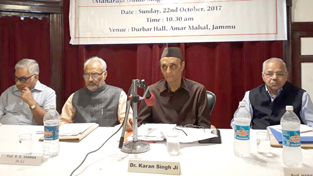
Excelsior Correspondent
JAMMU, Oct 22: In an apparent reference to the separatists and Kashmir centric elements, Member of Parliament and former Sadar-e-Riyasat Dr Karan Singh today said that it was Dogras who had given their blood for carving out Jammu and Kashmir State and extending its frontiers.
“Those who say that Jammu and Kashmir is ours, must not forget that Dogras have carved out this State and given their blood to extend its boundaries,” he said in his presidential remark while presiding over a national seminar, titled “Revisiting Historigraphy and Historical Discourse on Maharaja Gulab Singh”, by Maharaja Gulab Singh Research Centre, here today.
The scion of erstwhile Royal Dogra family rued that some historians have demonized Maharaja Gulab Singh despite his steadfast loyalty to Maharaja Ranjit Singh and even tried his best to save the Lahore Durbar from all intrigues after death of the later. “History needs to be revisited in right perspective,” he added and went on to elaborate how the contributions of Maharaja Gulab Singh in the realm of polity, society and economy remain valid even today.
Dr Karan Singh hoped that deliberations in the seminar would lead to unveiling other aspects of this fascinating ruler, an objective appreciation of his far reaching contributions and locating him in the annals of history to the place he so rightly deserves.
Earlier, Jammu University Vice-Chancellor, Prof R D Sharma said that the available narrative tends to follow unilinear trend in which Maharaja Gulab Singh’s military quality is highlighted at the cost of his other contributions and varied aspects of his personality.
Prof Harish Sharma, in his key note address, spoke about the biographical details of Maharaja Gulab Singh and the way it has been projected in the current historiography. He stated that the life and contribution of this phenomenal personality needs to be appreciated in the context of the time, a difficult one, in which he rose to prominence, became central to the political developments in the Lahore Durbar and finally managed to carve out one of the largest princely States.
Prof Shyam Narayan Lal introduced the subject and pointed out that given the state of current historiographic discourse on Maharaja Gulab Singh, which largely tends to be reductionist, it is urgently required that we engage in unraveling multi-layers of his character and contributions in order to do full justice to his ingenuity, determination and enterprise that enabled his rise to prominence and also to the making of the second largest princely state in British India.
In his welcome address, Brigadier J S Rajput also touched upon the aims and the objectives of Maharaja Gulab Singh Research Centre.
The inaugural session was followed by three academic sessions, in which papers were presented by Major Gen. Govardhan Singh Jamwal, Shiv Nirmohi, Manu Khajuria, Hans Raj Thakur, Vishal Baloria, Dr Bharti Gupta and others.
In the valedictory session, Prof Suman Jamwal summarized major findings emerging out of all the papers discussed in three academic sessions. The valedictory address was delivered by Dr Rakesh Battabyal.

